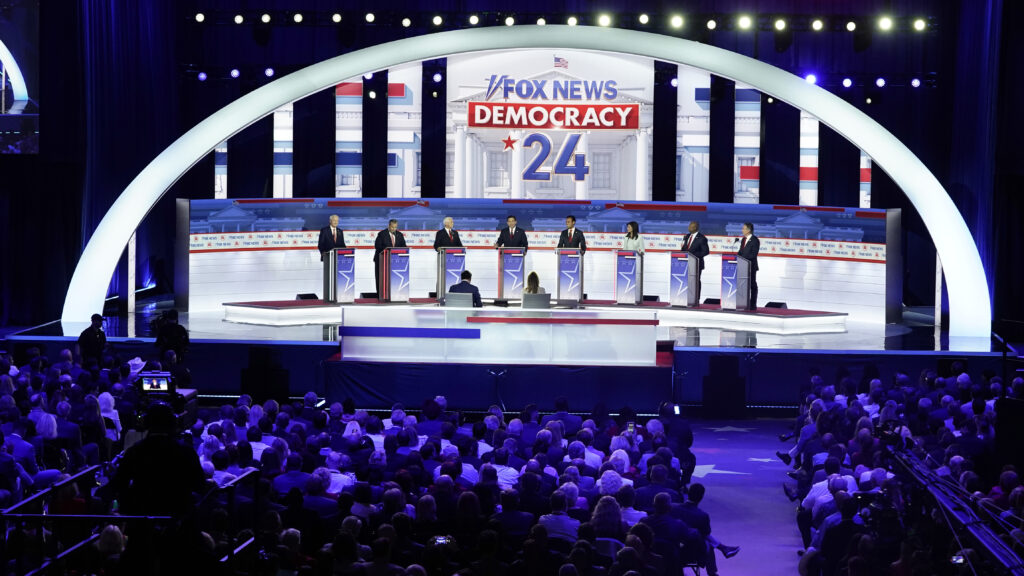WASHINGTON — Republican presidential candidates sparred Wednesday over a question that has haunted the party since The Supreme Court overturned Roe v. Wade: Now that abortion bans are possible, how far should they go?
Like voters, candidates splintered on the question. From a national ban to state decisions and when in pregnancy limits should be imposed, no two had quite the same answer.
advertisement
It’s a paradox for Republicans who have long argued that abortion policy should be returned to the states, but also that abortion itself is immoral. But it also comes as voters increasingly voice their opposition to more restrictive measures.
Former South Carolina Gov. Nikki Haley, who has endorsed a 15-week ban, swerved the dilemma by painting a national ban as wholly impossible anyway because of the support it would take in Congress. But even while describing herself as “unapologetically pro-life,” Haley, the only woman in the GOP race, was the most critical of efforts to make it federal policy.
“Unelected justices didn’t need to decide something this personal, because it’s personal for every woman and man. Now it’s been put in the hands of the people,” she said. “Let’s treat it like the respectful issue that it is, and humanize the situation and stop demonizing it.”
advertisement
Even Florida Gov. Ron DeSantis, who earlier this year signed into law a six-week abortion ban, appeared unwilling to fully commit to national restrictions.
“I understand Wisconsin is going to do it differently than Texas. I understand Iowa and New Hampshire are going to be different. But I will support the cause of life as governor and as president,” he said after being asked to clarify his stance.
Republican candidates are sharply aware of voters’ wariness towards restrictions on the procedure. Since the Dobbs decision last summer, six states have held referendums on abortion policy; in each, voters have upheld abortion rights or bucked new limits.
Sixty-one percent of Americans believe that overturning Roe v. Wade was a mistake, according to a Gallup poll this summer that also found that only 13% of Americans think abortion should be banned under any circumstances.
Two-thirds of Americans say abortion should be legal in the first trimester, or up to 12 weeks of pregnancy according to the same poll. That is far beyond near total-bans in 13 states including North Dakota and the six-week restriction DeSantis signed.
Like Haley, South Carolina Sen. Tim Scott and former Arkansas Gov. Asa Hutchinson back a 15-week ban. Entrepreneur Vivek Ramaswamy supports a six-week ban but has also said it is a state issue, much like Montana Gov. Doug Burgum, who has signed into law one of the country’s most restrictive policies.
The most staunch anti-abortion candidate is Vice President Mike Pence, who backs a national ban. He said during the debate that 70% of Americans support a 15-week ban but did not cite a source; Gallup polling shows that 70% of people oppose third-trimester abortions, or after 28 weeks of pregnancy.
Haley bit back at Pence’s abortion reasoning in one of many heated back-and-forths during the debate, and a moment of shrewdness about Americans’ divided abortion opinions.
“When you’re talking about a national ban, be honest with the American people. No Republican president can ban abortions anymore than a Democrat president could ban all those state laws,” Haley said. “So don’t make women feel like they have to decide on this issue when you know we don’t have 60 Senate votes and the House.”
The candidates barely touched on any health policy issues outside of abortion. DeSantis briefly dragged Anthony Fauci, after touting how open he kept Florida during the coronavirus pandemic. Ramaswamy called climate change a “hoax,” to a chorus of boos in the audience.
Multiple candidates also raised concerns about fentanyl overdoses, specifically in relation to their concerns about border control policy. Hutchinson, as former Drug Enforcement Administration head, was the first to mention the deadly drug while calling for more law enforcement. None focused on strategies to combat addiction.

